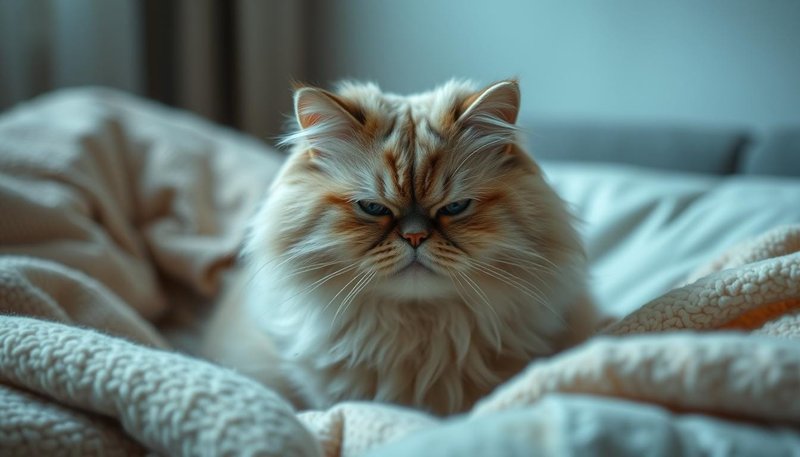
Think of it like tending to a delicate garden. Every unique flower has its own needs. Similarly, Persian cats have specific health concerns that need your attention. They can be prone to certain illnesses that require you to be vigilant as their loving owner. Let’s dive in and explore some common health problems in Persian cats and how you can prevent them.
Breathing Issues: The Flat-Faced Dilemma
One of the biggest issues for Persian cats is their unique face structure, also known as brachycephalic features. This means their short noses can sometimes lead to breathing problems. You might notice your cat has difficulty breathing, especially during playtime or heat. It’s honestly quite common; they might snore or even wheeze—a bit like a tiny, furry steam engine.
So, what can you do? First off, try to keep their environment cool and avoid high-stress situations that can exacerbate their breathing. Regular veterinary check-ups are crucial here. The vet can provide preventive care and monitor any potential issues early on. Ensuring your cat stays at a healthy weight can also help lessen breathing difficulties. A fat cat is often a struggling cat!
Signs to Watch For
Keep an eye out for the following signs that your Persian might be having breathing issues:
- Excessive panting
- Snoring or wheezing sounds
- Drooling more than usual
- Unwillingness to engage in normal activities
If you notice any of these, it’s time to schedule a vet visit.
Eye Problems: A Window to Their Health
Persian cats are known for their stunning, expressive eyes. However, with that beauty comes responsibility. They’re prone to a range of eye problems, including tear duct issues and conjunctivitis. Their excessive tear production can lead to staining, which might leave you feeling puzzled. Why does my beautiful cat have those tear-streaked cheeks?
Regular grooming is key here. You should gently wipe their eyes daily with a soft, damp cloth. This helps prevent tear staining and can keep their eyes clear of grime. Of course, if you notice any signs of redness or swelling, it’s best to consult your veterinarian for a proper diagnosis.
Common Eye Signs
Be aware of these signs that could indicate eye problems:
- Red or swollen eyes
- Excessive tearing or discharge
- Squinting or keeping eyes closed
- Changes in behavior, like being skittish or hiding
Prompt attention to these symptoms can prevent more serious issues.
Skin Diseases: Keeping That Fur Pristine
Another area where Persians might face trouble is their skin. With their long, fluffy coats, they can develop skin diseases like dermatitis or ringworm. These can be caused by allergies, parasites, or even poor grooming habits—who knew mats could lead to problems?
Regular brushing is essential. It helps remove loose fur and dirt, preventing mats and giving you a chance to check for any skin irritations. If your cat seems to be scratching a lot or you notice bald spots, it’s a good idea to get them checked by a vet. Early intervention can save both of you a lot of stress!
Simple Skin Check Routine
Make it a habit to regularly check your cat’s skin:
- Brush their fur a few times a week.
- Look out for red patches or bumps.
- Check for fleas or ticks, especially if they go outside.
- Monitor any excessive scratching or licking.
Getting ahead of skin issues can keep their coat gorgeous and healthy.
Kidney Disease: The Silent Threat
Kidney disease is another common health concern for Persian cats. It can be sneaky, often showing few early signs. You might notice your cat drinking more water or urinating frequently. These symptoms can be easy to overlook until the disease has progressed.
Keeping your cat hydrated is one way to help prevent kidney issues. Ensure they always have access to fresh water. Additionally, feeding them high-quality, moisture-rich food can boost their fluid intake. Regular vet check-ups can help catch any kidney problems early, allowing for better management.
Signs of Kidney Issues
Watch for these signs that could indicate kidney troubles:
- Increased thirst and urination
- Weight loss despite normal appetite
- Vomiting or lethargy
- Bad breath with a chemical odor
If you see these signs, a vet visit is definitely warranted.
Dental Disease: An Overlooked Concern
You might not think about dental disease, but it’s crucial for the well-being of your Persian. Oral health is often neglected in cats, yet it’s just as important as any other aspect of their health. Plaque can build up, leading to gum disease and painful infections.
Brushing your cat’s teeth can sound daunting, but starting early makes it easier. There are pet-safe toothpaste options to get them used to the idea. And don’t forget about dental treats! They can help keep those pearly whites clean while also giving your Persian a tasty snack.
Signs of Dental Problems
Keep an eye out for these dental issues:
- Bad breath
- Difficulty eating or chewing
- Red or swollen gums
- Excessive drooling
Regular dental check-ups at the vet can catch problems before they escalate.
Final Thoughts: Prevention is Key
Owning a Persian cat means navigating some unique health challenges, but with the right care and attention, you can help your furry companion thrive. Establishing a routine that includes regular vet visits, grooming, and feeding a balanced diet will go a long way in preventing many common health problems.
Just like nurturing a precious garden, all it takes is a little effort and love. By being proactive, you can enjoy many years of joy and companionship with your Persian. Remember, they depend on you to be their voice in health matters, so keep those ears perked for any changes. Healthy cats make for happy homes!

